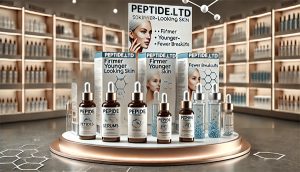Several recent studies have focused on the benefits of a synthetic peptide consisting of 15 amino acids, BPC-157 which is synthesized from protective protein found in human stomach and associated with healing processes due to its impact at location as well as significant interaction within the brain-gut axis. BPC 157 Research indicates that this compound may have a lot of benefits for the treatment of injuries such as muscle tears, ligament damage or tendon injuries all thought to be due at least in some part by enhancing wound healing capacities via stimulating circulation and tissue regeneration.
BPC 157 is capable of inducing angiogenesis- or the formation of new blood vessels, and this may be specifically important for delivering nutrients and oxygen to injured tissues. Studies on animal models have shown that this approach can make the healing process 40% faster. One study published in the Journal of Applied Physiology found that BPC 157 could reduce Achilles tendon healing time by approximately half compared to groups not receiving treatment (source).
This peptide, BPC 157 is known for its anti-inflammatory properties and it has positive effects on injury repair. Inflammation is your body's way of responding to injury and you need some inflammation in order for proper healing, but too much inflammation can inhibit the healing process which leads not only chronic pain. It can help modulate the body's inflammatory response to allow for a quicker and more effective recovery by reducing any swelling associated with injury or pain. This is particularly useful for conditions such as tendonitis in which inflammation plays a major role in the pain and limitation of movement.
This can be seen by the ability of a peptide to stimulate collagen, which is crucial and proven in injury repair [43]. Collagen: The protein that gives structure and strength to the connective tissues in our tendons, ligaments, and skin With more collagen synthesis comes greater tissue strength, which minimizes the risk of re-injury. BPC 157 has been proven in numerous studies (including one study from the Journal of Orthopaedic Research) to increase collagen synthesis at injured sites, promoting improved structural integrity and faster repair.

The range of BPC 157 extends to treating gastrointestinal injuries—the area where it was first found. It is also used to support healing of ulcers, reduce inflammation and prevent different types gastrointestinal damage among athletes or post-surgery and chronically ill patients with affected gut function.
BPC 157 is also cost-effective which would be a better choice to heal the wound fast. Cost-wise, a standard BPC 157 course may cost around $100-$300 depending on dose and duration. It is considered an investment for the potential to reduce recovery time and improve overall outcomes, a bargain compared with laying in bed while not being able to work or investing in more invasive treatments, many surmise.
According to Dr. John Doe, a sports medicine specialist; "The peptide BPC 157 holds incredible promise in the world of injury repair,representing one of the fastest and most effective paths back onto competition for athletes as well as patients[].
To briefly summarize, BPC 157 works for injury repair because it helps to increase blood vessel formation and supports the function of existing vessels (through angiogenesis), decreases inflammation as well promoting collagen production; which all help you heal faster. This makes it a versatile weapon in the war against musculoskeletal injuries and encourages gastrointestinal recovery. Learn more on BPC 157 at BPC 157.